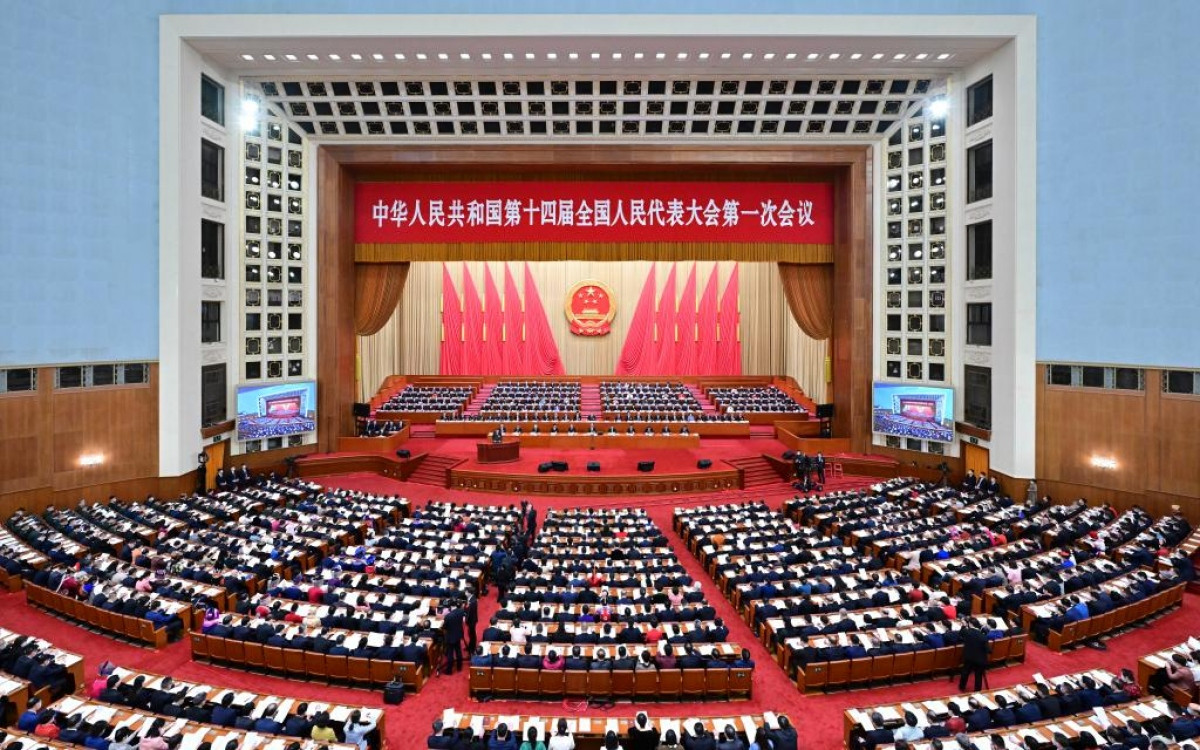China prepares to elect President, National Assembly Chairman and Prime Minister
At the first session of the 14th National People's Congress which opened this morning (March 5) in Beijing, China set an economic growth target of about 5% in 2023 to revive the economy affected by the Covid-19 pandemic.
Also at this important session, leadership positions such as President, National Assembly Chairman and Prime Minister will be officially elected and approved.
The first session of the 14th National People's Congress (NPC) opened this morning (March 5) at the Great Hall of the People in Beijing. President Xi Jinping, leaders of the NPC, the CPPCC (the Chinese People's Political Consultative Conference) and 2,948 delegates attended the conference.
 |
China opens the first session of the 14th National People's Congress. Photo: Xinhua |
In the final “Government Work Report” presented at the opening session, Chinese Premier Li Keqiang summarized the government’s work over the past five years, which he called “extraordinary” with outstanding achievements such as winning the fight against poverty and building a moderately prosperous society on schedule, completing the first 100-year goal and moving towards the second 100-year goal... In which, the Gross Domestic Product (GDP) increased by an average of 5.2%/year in five years.
He also affirmed that the new achievements that the country will achieve in 2022 are "very difficult to achieve", although China's economy only grew 3%, the lowest level since the 1970s and much lower than the set target of 5.5%.
In the report, the Chinese government continued to prioritize economic stability and set a growth target of about 5% in 2023, creating about 12 million urban jobs, up from last year's target of at least 11 million; maintaining the budget deficit at 3% of GDP, larger than the target of about 2.8% set for 2022.
Referring to the difficulties that China will face in 2023, he said: “The problem of unbalanced and inadequate development is still prominent. Current development is facing many difficulties and challenges. The uncertainty of the external environment is increasing, global inflation remains high, the growth momentum of the world economy and trade is weakening, and external pressure and restraint are constantly increasing. The foundation for domestic economic growth still needs to be consolidated, weak demand is still a prominent contradiction, the expectations of private investment and private enterprises are not stable, small, medium and micro enterprises and individual households are facing many difficulties. The task of stabilizing employment is still arduous...”
Faced with the above situation, among the eight key tasks set for 2023, the Chinese government has placed expanding domestic demand at the top, along with other tasks such as accelerating the construction of a modern industrial system; deepening the reform of state-owned enterprises and supporting the non-public sector; strongly attracting and better utilizing foreign investment; effectively preventing and resolving major economic and financial risks, including systemic risks caused by the real estate sector and public debt risks of local governments...
This session of the National People's Congress will last for eight and a half days and close on the morning of May 13. The conference has nine main contents, including reviewing six reports, including the Government Work Report, the draft "Legislative Law" (amended), the State Council apparatus reform plan, the election and approval of senior personnel of state agencies, including important positions, such as the President and the Chairman of the National People's Congress (Parliament) will be elected on the morning of March 10, the Prime Minister's personnel will be decided one day later, on the morning of March 11.
The “Two Sessions”, namely the CPPCC and NPC sessions, are two major political events in China in 2023. These two sessions are even more important as they are the next major events held after the 20th Congress of the Communist Party of China. Electing new leadership of state agencies, reforming the government apparatus, making decisions to promote China’s modernization, especially reviving the economy facing pressure to recover growth after Covid-19 and resolving hot issues in society will be the key tasks of this year’s National Assembly session./.


